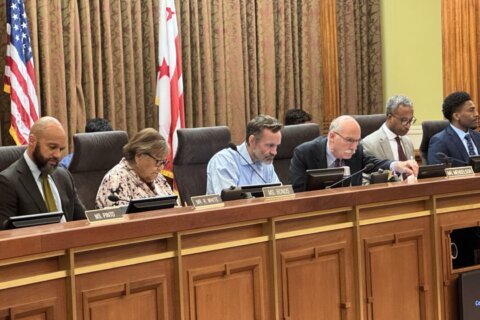Do you know if either one of your grandparents was ever diagnosed with cancer? What about aunts, uncles or siblings? A Maryland doctor wants Black Americans to ask about family histories that might indicate they’re at higher risk for certain diseases and cancers.
“National Black Family Cancer Awareness Week is designed to increase cancer awareness in one of our most vulnerable segments of the U.S. population, the Black population,” said Dr. Eddye Bullock, the assistant chief for adult family medicine for Kaiser Permanente in Baltimore.
“And knowing the warning signs and what to look for to help decrease these bad health outcomes. Because if we find cancer early, we can potentially save your life or prevent other things that happen that are not so good,” she said.
Bullock said it’s unfortunate that in Black communities, talking about family medical history has been very taboo in the past, which “doesn’t serve the patient.”

Knowing family history may change the screening process if there are multiple first-degree relatives, such as grandparents, parents or siblings with certain cancers.
“For example, for breast cancer, if they had breast cancer and they had it at a certain age, your screening interval may change, may be needed to be started earlier, more frequently. You may need additional testing that may need to be done,” Bullock said.
The four most common cancers — lung, breast, prostate and colorectal — account for more than half of all cancer cases among the Black community. In addition to family histories, it’s important to know what to look for.
- Lung cancer: How much you smoke and for how long may have an impact on when to start lung cancer screenings.
- Breast cancer: Family history may make you at higher risk and affect when to start doing breast cancer screenings and having discussions with your doctor.
- Prostate cancer: Changes in urination might indicate a need to follow up with a primary care doctor.
- Colorectal cancer: Symptoms can include changes in stool or bowel habits, constipation, abdominal pain or blood in the stool.
Bullock believes people should advocate for their health, talk openly with their doctors and seek care elsewhere if needed.
“You want to feel that you have that trust, that you’re being heard and listened to. And that whatever is being told to you is explained. So if the doctor says stuff that you don’t completely understand, you need to say, ‘Hey, I’m not clear on this. Please explain why we’re doing this — why?’ And the doctor should be able to explain to you a little bit better why we’re doing this, why we’re not doing that,” she said.
A report recently published in JAMA Oncology, a peer-reviewed medical journal, found that “while cancer mortality decreased considerably among Black individuals from 1999 to 2019, the cancer mortality rate was higher among Black men and women than in other racial and ethnic groups in 2019.”
The report’s authors state that greater emphasis should be aimed at understanding the contribution of social inequities to higher cancer mortality rates in Black communities.
“Addressing inequalities that contribute to racial disparities in cancer mortality requires policies that seek to resolve adverse socio-environmental conditions and determinants that contribute to inequities throughout the entire continuum of care,” the report said.
“In 2019, Black individuals continued to have the highest cancer mortality rates compared with other racial and ethnic groups, suggesting a need to address the pervasiveness of long-standing racial and ethnic inequities. Eliminating racial and ethnic disparities in cancer mortality will require equitable access to cancer prevention, early diagnosis and timely and guideline-adherent high-quality care.”
Bullock’s advice for caregivers is to address cancer risk factors and screenings with Black patients, regardless of the purpose of an office visit.
“Because we know a lot of patients, especially Black patients, may not have easy access to come in because of their jobs, may not have sick leave, so when they come in for their back pain, we address those cancer screenings. ‘Are you up-to-date with it?’ We don’t wait for just when you come in for your physical,” she said.
Bullock also emphasizes that a healthy lifestyle, which includes quitting smoking, eating well with a balanced diet and exercising, can help reduce risk.
“Because we do know that obesity can contribute to multiple cancers,” Bullock said.








